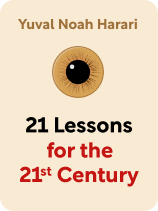

This article is an excerpt from the Shortform book guide to "21 Lessons for the 21st Century" by Yuval Noah Harari. Shortform has the world's best summaries and analyses of books you should be reading.
Like this article? Sign up for a free trial here .
What is secularism? What do people in a secular society think of morality?
Secularism is the principle of separation of civic and political affairs from religious institutions. In a secular society, human affairs are conducted based on naturalistic considerations, but that doesn’t mean that there is no morality. In secularism, morality is considered to be a common human trait, regardless of faith or religious background.
Keep reading to learn about morality in a secular society.
Code of Ethics in a Secular Society
Religion demands faith and commitment to one God and one set of beliefs, which necessarily closes followers off to other ideas. By contrast, secular religions consider wisdom and morality to be common human traits, which makes secular people more accepting of different beliefs and identities. Instead of committing to a set of beliefs, secular people adhere to a core set of ethics, which includes:
- Truth: The most important secular value is truth that’s based on evidence and observation, as opposed to a truth dictated by faith. Whereas religious followers find their truth from faith leaders and in holy texts, secular people don’t look to any single source as the primary holder of truth—instead, they seek pieces of truth wherever it exists. Although science and religion aren’t mutually exclusive, the secular attitude toward finding truth through evidence and observation is the foundation of scientific discovery.
- Compassion: Secular people value compassion for everyone, regardless of their membership to any religion or group. Whereas religious followers preach compassion as a form of honoring and obeying God’s wishes, secular people value compassion because of a general appreciation for human suffering. As a result, the secular form of compassion remains stable, while faith-based compassion can waver if it conflicts with God’s desire to shun non-believers or punish sinners.
- Equality: The secular values of truth and compassion produce a strong commitment to equality. Since secular people approach issues based on truth and information, and they recognize suffering as suffering—no matter who’s experiencing it—they give the same weight to the rights, experiences, and grievances of everyone equally.
- Freedom: Freedom is essential to pursuing truth, spreading compassion, and achieving equality. Secular people believe that individuals should be free to question, doubt, explore, and reach their own conclusions. For this reason, they don’t appoint any leader, text, or institution as the arbiter of true and false, right and wrong.
- Courage to admit ignorance: The courage to admit ignorance and mistakes is absolutely essential to the secular commitment to truth: If you don’t acknowledge what you don’t know, then you’ll never seek more information. By contrast, religion often instills a fear of the unknown and deters followers from admitting any questions or holes in the information set forth by the faith. When people fear that their truth could collapse, they’re much more likely to be violent and aggressive to perceived threats to their beliefs than people who are open to learning and evolving.
- Responsibility: Responsibility is foundational to secularism because, in the absence of an all-powerful God to right the world’s wrongs, that duty falls on people. For this reason, secular people take great pride in humankind’s accomplishments, from resolving social issues to making scientific discoveries. By the same token, secular people can’t blame war, disease, or climate change on God’s will—rather, they must take accountability and ask how they can help resolve the problem.
In a secular society, it is recognized that these values are innate in all humans, so secular people can appreciate when religions uphold the same values. As such, a secular society would embrace religious people as long as the faithful follow secular values above religious codes. For example, although Judaism proclaims that Jews are the chosen people—and, thus, superior to gentiles—Jews are expected to respect everyone’s equality in a secular society. However, secular society does not oblige religious people to forego their beliefs or ceremonies. Secular people’s appreciation for freedom extends to everyone’s right to worship according to their individual beliefs.
Secular Movements Can Become Dogmas
With its commitment to the pursuit of truth, compassion, equality, and freedom, secularism sets ideals that are difficult—if not impossible—for people to achieve, and the challenge is even greater for large societies. As a result, many secular movements have morphed into dogmas.
One example is Marxism, which began with Karl Marx’s conviction that people should abandon religion and seek their own truths. Over time, the difficulty of the truth-seeking and the challenges of the war and revolution eroded Marx’s secular vision. When Stalin held power, he transformed Marxism: Stalin declared that it was too difficult for the general public to uncover the truth about the world, and that they should simply trust whatever the Soviet Communist Party said.
While some mutated dogmas are harmful, others have positive effects. An example of this is the doctrine of human rights, which began as a secular view of freedom and equality that eventually became a dogma of humans’ natural right to life and liberty. In reality, people aren’t born with these inalienable rights—but the belief in them has limited the harm of authoritarians and protected billions of people from brutal effects of violence and poverty.
This transformation isn’t limited to secularism—every religion and ideology has some form of distortion, or shadow. For example, Christianity’s teachings of faith and love have been twisted many times to produce holy wars and the Inquisition. Although the shadow doesn’t represent an ideology’s true values, followers must still examine how these mutations happen. Secularism’s commitment to truth and admitting mistakes should make its followers particularly willing to take this hard look.

———End of Preview———
Like what you just read? Read the rest of the world's best book summary and analysis of Yuval Noah Harari's "21 Lessons for the 21st Century" at Shortform .
Here's what you'll find in our full 21 Lessons for the 21st Century summary :
- What the unique challenges of the 21st century are and will be
- Why religion can't solve these 21st-century challenges
- How algorithms like Netflix recommendations are teaching you not to trust yourself






